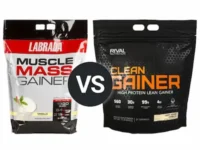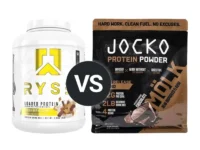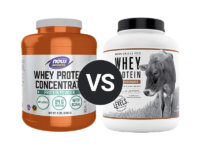Knowledge BaseYou're Questions Answered
BACK
Are protein powders a waste of money?
Protein powders are a popular supplement among athletes, bodybuilders, and health enthusiasts, but there is often debate about whether they are a worthwhile investment. The answer depends on individual dietary needs, goals, and the quality of the protein powder being considered.
Benefits of Protein Powders
- Convenience: Protein powders offer a quick and convenient way to increase protein intake, especially for those with busy lifestyles. They can be easily added to shakes, smoothies, and various recipes to boost protein content1.
- Muscle Growth and Repair: For individuals engaged in regular physical activity, especially strength training, protein powders can support muscle growth and repair by providing essential amino acids needed for muscle protein synthesis2.
- Weight Management: Protein can help with weight management by promoting satiety and reducing overall calorie intake. High-protein diets have been shown to support weight loss and maintenance3.
- Dietary Flexibility: Protein powders are available in various forms, including whey, casein, soy, pea, and hemp, catering to different dietary preferences and restrictions4.
Considerations When Using Protein Powders
- Quality: The quality of protein powders can vary widely. It is essential to choose products that are third-party tested for purity and accurately labeled regarding their nutritional content5.
- Dietary Needs: Not everyone needs protein supplements. Those who already consume sufficient protein through their diet may not benefit significantly from additional protein powder6.
- Cost: Protein powders can be expensive, and their cost-effectiveness should be evaluated against whole-food protein sources, which also provide additional nutrients7.
- Overconsumption: Excessive protein intake can strain the kidneys and liver, especially in individuals with preexisting conditions. It is crucial to consume protein powders in moderation and as part of a balanced diet8.
In conclusion, protein powders are not inherently a waste of money, but their value depends on individual needs and circumstances. For those who require additional protein intake for muscle growth, recovery, or dietary convenience, high-quality protein powders can be a beneficial supplement. However, for individuals who already meet their protein needs through whole foods, the additional expense may not be necessary.
Was this answer helpful? Let us know!
Like
References:
- Hoffman, J. R., & Falvo, M. J. (2004). Protein – Which is Best? Journal of Sports Science and Medicine, 3(3), 118-130.
- Tipton, K. D., & Wolfe, R. R. (2001). Exercise, protein metabolism, and muscle growth. International Journal of Sport Nutrition and Exercise Metabolism, 11(1), 109-132.
- Leidy, H. J., Clifton, P. M., Astrup, A., Wycherley, T. P., Westerterp-Plantenga, M. S., Luscombe-Marsh, N. D., ... & Mattes, R. D. (2015). The role of protein in weight loss and maintenance. The American Journal of Clinical Nutrition, 101(6), 1320S-1329S.
- Gorissen, S. H., Crombag, J. J., Senden, J. M., Waterval, W. A., Bierau, J., Verdijk, L. B., & van Loon, L. J. (2018). Protein content and amino acid composition of commercially available plant-based protein isolates. Amino Acids, 50(12), 1685-1695.
- Consumer Reports. (2019). How to Choose Supplements Wisely.
- Phillips, S. M., & Van Loon, L. J. (2011). Dietary protein for athletes: From requirements to optimum adaptation. Journal of Sports Sciences, 29(sup1), S29-S38.
- Schaafsma, G. (2000). The protein digestibility-corrected amino acid score. Journal of Nutrition, 130(7), 1865S-1867S.
- Brändle, E., Sieberth, H. G., & Hautmann, R. E. (1996). Effect of chronic dietary protein intake on the renal function in healthy subjects. European Journal of Clinical Nutrition, 50(11), 734-740.
Add to this Answer
Related Questions
Related Reviews

Disclosure
Your Answer
Do you have a suggestion to improve the answer? Please detail your suggestions and provide any references to information that may support your answer if available.
The content on this site has not been written, reviewed or endorsed by a medical professional. We assume no liability for the misuse of supplements and recommend you review the label of any product, as well as consulting with your health care professional.
We are a participant in the Amazon Services LLC Associates Program, an affiliate advertising program designed to provide a means for us to earn fees by linking to Amazon.com and affiliated sites.
We are a participant in the Amazon Services LLC Associates Program, an affiliate advertising program designed to provide a means for us to earn fees by linking to Amazon.com and affiliated sites.
© 2025 ProteinPowder.com



